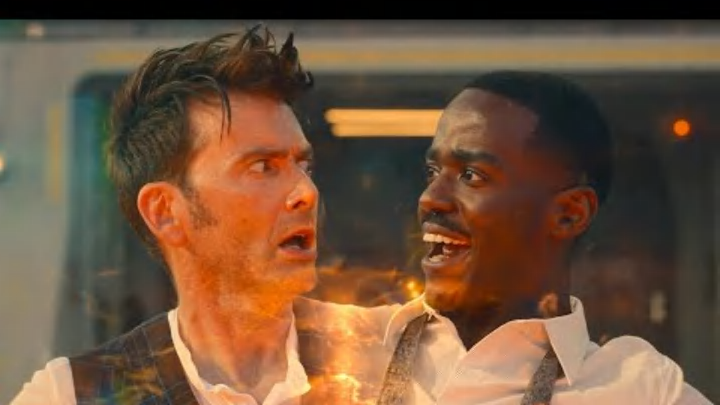When Ncuti Gatwa was first announced as the Doctor in May 2022, we didn’t know that we’d be given not one but two surprises on the road to his first appearance in Doctor Who. First, there was the reveal at the end of the centenary special The Power of the Doctor that, with the return of David Tennant as a new incarnation, Gatwa wouldn’t be playing the Fourteenth Doctor, but the Fifteenth. That in itself was quite a shock.
But then we saw The Giggle, the third of last year's 60th-anniversary specials, and that’s when we got our second surprise regarding Gatwa’s Doctor. We knew that the episode would see the regeneration from Tennant to Gatwa. At least, we thought we did.
What we didn’t expect to happen was something brand new - a bi-generation. Rather than showing the change from one Doctor to the next, as depicted so many times before, we saw the Doctor split into two. We finally got to see Gatwa’s Fifteenth Doctor, but Tennant’s Fourteenth Doctor also got to continue.
So what is bi-generation? And how did it happen? When initially describing it, Gatwa’s Doctor described it as a “myth”, at least until that moment. There are two possible explanations for how it happened. The first is the Toymaker affecting the rules of reality, as later described when the new Doctor splits the TARDIS into two and describes it as getting his prize.
However, there’s also another possibility. The novelization of The Giggle by James Goss reveals exactly how long the gap is between the Thirteenth Doctor’s regeneration into Fourteen and the bi-generation - 15 hours. Not only is that an extremely short length of time for all of the Fourteenth Doctor’s on-screen adventures. As stated in The Christmas Invasion, it’s also the same amount of time that the regeneration cycle normally lasts. The Doctor being mortally wounded again at exactly the right moment might have been what caused the bi-generation.
Just split Doctors, or something timey-wimey?
There’s another question to ask regarding the bi-generation. Are the Fourteenth and Fifteenth Doctors now completely separate, with their own sets of regenerations and their own lives to live apart from each other? That’s certainly one possibility. Fifteen even later describes the experience to Ruby as his soul being torn in half in The Devil’s Chord.
The novelization of The Giggle introduces another idea, though. Just after the defeat of the Toymaker, the Fourteenth Doctor is suddenly afraid of simply fading away. That at any moment, his life could suddenly end and that he’s only on borrowed time. However, he’s only briefly worried about this - just as in the TV special, he still gets his happy ending - and he seems as uncertain about the bi-generation as we are. But it’s still interesting that Fourteen might not have the same benefits as his next incarnation, at least not post-bi-generation.
However, there’s one more possibility that the Fifteenth Doctor briefly hints at. While addressing that the Fourteenth Doctor needs time to emotionally heal and recuperate, Fifteen says he’s only fine because Fourteen fixes himself. And then we get this brilliant little line:
"We’re Time Lords, we’re doing rehab out of order."Fifteenth Doctor
It’s a small moment, but it hints at the idea that in some way, Fourteen and Fifteen still share the same existence. That Fifteen, despite being “born” out of the bi-generation and splitting from Fourteen, somehow has all the experiences that Fourteen is yet to have.
So how does Fourteen become Fifteen if this happens? Perhaps he does fade into energy as the novelization hints. Perhaps that energy gets sent back to the bi-generation itself and becomes the Fifteenth Doctor. How? Because the Doctor is a Time Lord and Time Lords have a very timey-wimey existence.
Honestly, it’s a ridiculous theory. It makes no sense. And that’s probably why it’s my favorite. Partially because I like the idea that, even while they’re living separate lives, the Fourteenth and Fifteenth Doctors are still connected. They're not clones or duplicates, but distinct lives with shared experiences. Rather like all the Doctors, really.
But the timey-wimey possibility is appealing because it doesn’t need to make sense. Doctor Who is a series that’s at its best when it has just a little bit of magic to it. After all, it’s a series about an ancient being who travels in a magic box that’s bigger on the inside than the outside. It’s not fantasy, but it’s not hard science-fiction either. And the idea of its main character being split into two and yet still one, of their past/future selves, sharing the same present, has exactly the right amount of magic to it.
